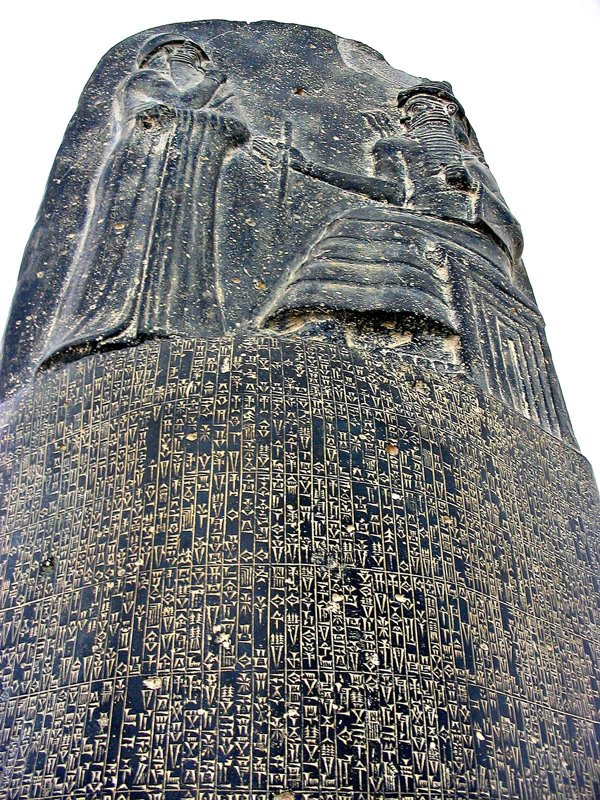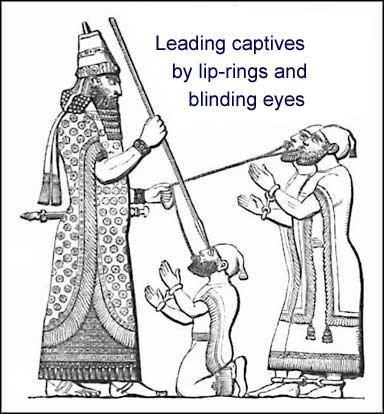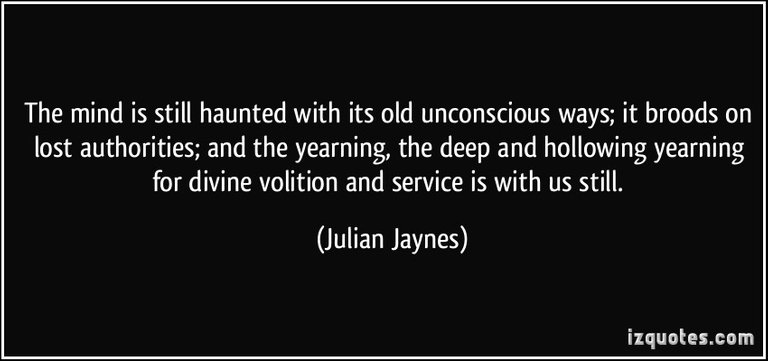
And he calls it “hallucinatory” because these hallucinations, after a while, were equated with the voices and even visions of god like figures. But of course… I hear you say: so, what happened to the human brain? Why can’t we hear anymore the voices of gods in our head? Where has gone the hallucinatory area, when, why and how did we end up with consciousness as we know it today?
.jpg)
To silence a God, put his words in writing
Since the Bicameral Mind, Civilization and Language were tightly intertwined, it is only normal to take a look at how WRITING just changed the rules of the game.
In the bicameral era, the bicameral mind was the social control, not fear or repression or even law. All initiative was in the voices of gods. [...] Within each bicameral state, therefore, the people were probably more peaceful and friendly than in any civilization since.
As the bicameral theocracies prospered, they grew and became more and more complex. So, the more the people, the less the bicameral mind was able to effectively rule upon them. It was simply not enough any more and the bicameral states had to resort to more and more complex theocracies and theologies:
Once cities become a certain size [...] the bicameral control must be extremely precarious. The hierarchy of priests to sort out the various voices and give them their recognitions must have become a major preoccupation as bicameral cities grew in size.

And once the word of god was silent, written on dumb clay tablets or incised into speechless stone, the god’s commands or the king’s directives could be turned to or avoided by one’s own efforts in a way that auditory hallucinations never could be. The word of a god had a controllable location rather than an ubiquitous power with immediate obedience.
It makes definitely sense: when the voice comes from inside your own head, you can’t press your hands on your ears as much as you want, but you can’t stop them. While, if the commandments are written, just close your eyes or turn away your gaze.
Invasions and Irreversible changes
How much important was writing in the weakening of the auditory hallucinations, it was not enough by itself to collapse the whole bicameral mind. For that, it needed cataclysmic changes, triggering an evolutionary change in the brain of humans itself.
The second millennium BC was heavy laden with profound and irreversible changes. Vast geological catastrophes occurred. Civilizations perished. Half the world’s population became refugees. And wars, previously sporadic, came with hastening and ferocious frequency.


The impact was felt all over the Mediterranean and triggered a huge procession of mass migrations by people fleeing in search for food, shelter and better climate.
The result is that, in the space of a single day, whole populations or what survive of them are suddenly refugees. life files of dominoes, anarchy and chaos ripple and lurch across the frightened land as neighbor invades neighbor. And what can gods say in these ruins? What can the gods say, with hunger and death more strict than they, with strange people staring at strange people, and strange language bellowed at uncomprehending ears?
Jaynes notes that it is at this period that are discovered some of the first harshest and most cruel laws ever devised by humans, in the person of the Assyrians.

The most powerful king of this middle Assyria was Tiglath-Pileser I (1115-1077BC). Note how he no longer joins the name of his god to his name. His laws have come down to us in a collection of cruel tablets. Scholars have called his policy “a policy of frightfulness”. His laws meted out the bloodiest penalties yet known in world history for even minor dismeanors.

This “policy of frightfulness” is necessary - it seems - to control, enslave, rule over increasingly desperate and lost crowds of refugees because the mix of population means that the bicameral control has vanished for a good part and we are on the brink of a new type of consciousness.
Man had become aware of himself and his world.
A change of mind
Wars, rapes, famines, cataclysms… It looks like a hefty price to pay for the human achievement of our modern consciousness. But there was no coming back. As say Jaynes:
Man was trapped in his own civilization. Huge cities simply are there, and their ponderous habits of working keep going even as their divine control lapses away.
Moreover, all these cataclysms pushed men into contact with one another, while they had been rather distant so far. The world was big enough before the huge catastrophes. Now that different populations were meeting each other by force of circumstances, the game changed:
In the forced violent intermingling of peoples from different nations, different gods, the observation that strangers, even though looking like oneself, spoke differently, had opposite opinions, and behaved differently might lead to the supposition of something inside of them that was different.
It’s one thing to live in the same tribe, nation all his life and meeting the same kind of people. You speak, dress, eat, and think like them all and you have no reason to see yourself any different from any other. Then, you meet someone completely different, and you start to see that everyone might be… unique.
Jaynes also advances that this intermingling of population brought lies and deceit into the world, which helped our modern consciousness to develop:
Overrun by an invader, and seeing his wife raped, a man who obeyed his voices, would, of course, immediately strike out, and thus probably be killed. But if a man could be one thing on the inside and another thing on the outside, could harbor his hatred and revenge behind a mask of acceptance of the inevitable, such a man would survive.
Discovering the power of duplicity is an evolutionary advantage for men and women to survive in cruel and unjust times.
New tools are required to connect with reluctant gods
Therefore, in those strange times, the gods retreated from the surface of the Earth and became not only invisible, but also inaudible, and humans had to resort to a whole different sorts of practices to find out their will.
Jaynes mentions it in relation with the poetry and tablets discovered in relation with Tukulti-Ninurta I, tyrant of Assyria (about 1230 BC). Here are lines discovered on tablets:
My god has forsaken me and disappeared / My goddess has failed me and keeps at a distance. / The good angel who walked beside me has departed.
With the involuntary inhibition of the right hemisphere areas involved into bicameral thinking, the gods have stopped talking and the humans are left clawing their ways and paths in an altogether new world, more difficult, more realistic and cruel. But the idea of gods and the idea that gods are still the reference in matter of right and wrong is still prevalent and there are ways to find what right and wrong is:
- Prayers
In bicameral era, prayers were unnecessary. The voices came by themselves according the situation. But now that gods have “stopped talking” on their own accord, their voices must be called upon emphatically and repeatedly.
- Celestialization of gods and angels as their emissaries
With the gods not “walking along” humans, it is left in some case to the angels and demons, the emissaries of the deities, to visit the humans to bring messages from divinities.
These supposed personnel of the celestial courts are found with increasing frequency in Assyrian cylinder seals and carvings.
Also, these angels and demons are used as messengers because the gods have completely retreated from the human world and disappeared into the sky or beneath the earth.
So it seems to be accepted that the dwelling place of the now absent gods is with Anu in the sky. And this is why the forms of angels are always winged: they are messengers from the sky where the gods live.
As evidence of this paradigm shift, Jaynes also highlights a shift in the ziggurat’s architecture, which became a pedestal altar to welcome gods:
For the sacred tower of the ziggurat was now a landing stage to facilitate the god’s descent to earth from the heaven to which they had vanished.
- Divination
Gods being reluctant to speak directly and without emissaries, humans invent new ways to divine their words, be it through omens…
It is simply an extension of something common to all mammalian nervous systems, namely, that is an organism experiences B after A, he will have a tendency to expect B the next time that A occurs. [...] it is really only after the loss of the bicameral mind toward the end of the second millenium BC that such omen texts proliferate everywhere and swell out to touch almost every aspect of life imaginable.
- … or sortilege…
There was no concept of chance whatever until very recent times. Therefore, the discovery of deciding an issue by throwing sticks or beans on the ground was an extremely momentous one for the future of mankind. Because if there was no chance, the result had to be caused by the gods whose intentions were being divined.
- … or augury…

The most common way of augury was through animal organs. It was a more “precise” way of divining than the sortilege, more “qualitative” but required interpretation:
Any atrophy, hypertrophy, displacement, special markings, or other abnormalities, particularly of the liver, was a divine message metaphorically related to divine action.
All these divinatory ways are useful for man to connect to his gods. They are not perfect, they are constantly evolving and eventually will be less and less powerful, as the religions evolve themselves and turn toward the shape of monotheist religion, toward a one and unique god, far from the confusing and silent gods of the bicameral eras.
And eventually, after analysing the Iliad at the start of his book, Jaynes turns towards the other great Homeric epic, the Odyssey, which - he alleges - speaks about the breakdown of the bicameral mind and shows how the hero is there completely different from Achilles and Agamemnon and is driven not so much by gods as by his own conscience and will. And it will be the subject of our next article.
To be continuedSource:
http://www.julianjaynes.org/about-julian-jaynes-theory.php
Previous articles about the Bicameral Mind:
THE BICAMERAL MIND - Its importance in the birth of civilization

Congratulations @herverisson! You have completed some achievement on Steemit and have been rewarded with new badge(s) :
Click on any badge to view your own Board of Honnor on SteemitBoard.
For more information about SteemitBoard, click here
If you no longer want to receive notifications, reply to this comment with the word
STOPBy upvoting this notification, you can help all Steemit users. Learn how here!
Awesome..upvoted...resteemed
Thanks!
Very interesting stuff. well worth a read
Incredible read! +up +restm
Will definately have to check out the rest of the articles - so much for sleeping tonight! xD
Glad you liked it :) Can't recommend enough to read the whole book (accessible in pdf) when you'll have more time, but i'm doing my best to give you the best idea of it :)
Definitely wet my appetite. Thank you for the post!
Geat work my dear so I vote you
These pictures are really wowsome. These picture will be the greatest reward to Steemit. Your artistic task is amazing. This Picture and writing is fine work........
You didn't really read the article, right?
Good post @herverisson